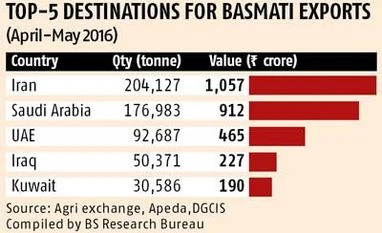India's basmati rice harvest, which has been facing headwinds of late due to quarantine issues, could find a new market as China's plant quarantine and inspection body has agreed to undertake a survey of all the 19 rice mills registered with India's National Plant Protection Organisation (NPPO).
The inspections will be for presence of 'khapra' beetle in Indian basmati rice.
However, inspection does not mean that China has opened the doors for import of basmati rice from India.
These mills are situated in states such as Punjab, Haryana, Uttar Pradesh and Madhya Pradesh, among others.
On basmati rice, traders and senior officials said the inspection is not related to its exports as China's has its own rice variety which is similar to India's and whatever shortfall it faces is compensated by imports from Pakistan.
"There is no question of China allowing imports of non-basmati rice as it already has its own varieties and as far as allowing imports of basmati rice is concerned, yes they have agreed to inspect our facilities, but there is no commitment that it will materialise into firm export orders," Rajen Sundaresan, Executive Director, All India Rice Exporters Association (AIREA) told Business Standard.
More From This Section
Agricultural & Processed Food Products Export Development Authority (APEDA), which is part of the Indian commerce ministry, is also involved in the process.
India had earlier sent the information sought by AQSIQ regarding the quality protocol and standard operating procedures.
India accounts for over 70% of the world's basmati rice production. However, it constitutes a small portion of the total rice produced in India. By volume, the share of basmati rice was around 6% in India's total rice production in 2014-15. By volume, however, basmati rice exports accounted for 57% of India's total rice exports in 2014-15.
Studies show that basmati rice exports have increased at a compounded annual growth rate (CAGR) of 27 per cent from Rs 28.24 billion in 2004-05 to Rs 275.98 billion in 2014-15.
The proportion of basmati rice exports in India's total exports has increased from around 0.6 per cent to around 1.3 per cent during the last one decade.
While basmati rice is consumed across the globe, West Asian countries account for 75 per cent of Indian basmati rice exports in 2014-15.
Within West Asia, Iran and Saudi Arabia are the two largest buyers, together accounting for over 50 per cent of basmati rice exports from India.
India's goods trade deficit with China has surged from $1.1 billion in 2003-04 to $52.7 billion in 2015-16.
)